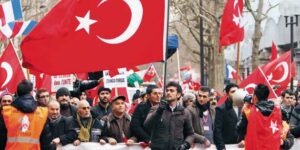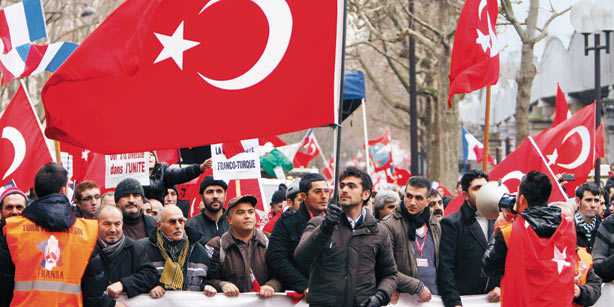 The recent step by France with respect to the 1915 incidents represents a great victory for the Armenians before 2015, the 100th anniversary of the incidents.
The recent step by France with respect to the 1915 incidents represents a great victory for the Armenians before 2015, the 100th anniversary of the incidents.
The rising image of France, which kept its promises to the Armenians, may appeal to the leaders of other countries where the Armenian diaspora has been active. Leaders who exerted efforts to attract the support of Armenians in elections have more often than not changed their attitude and stance after the elections; in most cases, they failed to keep the promises they made during their election campaigns. This situation has now been changed.
Yerevan welcomed the French move, as evidenced by joyous demonstrations held around the French Embassy by Armenians and political party representatives. In particular, old ladies hugged the French diplomats and officers there and sobbed; this sends a clear message and signal as to what sort of sensitivities should be held on the matter. Turkey, which failed to appreciate and notice the growing French investments in Armenia following an important visit by Nicolas Sarkozy to Yerevan in October, was shocked by the French move and started new discussions on French policy.
As these discussions now focus on what kind of attitude Turkey should adopt vis-à-vis France, the Armenian side refers to this ironic situation as surprising; it seems Turkey has been ignoring the main points — that is to say, the 1915 and Armenian issues. Armenian experts note that Turkey should develop dialogue with Armenia immediately and recall that they do not understand why Turkey is focusing on potential measures against France.
The Armenian authorities last year set up an international commission for the remembrance and commemoration of the 100th anniversary of the Armenian genocide; the commission has so far engaged in lobbying activities and carried out a number of studies as well as completed scientific research concerning 2015. Likewise, Armenia has intensified its ties with the diaspora; to this end, they held meetings where they decided to generate policies focusing on the link between Armenia, the diaspora and Nagorno-Karabakh.
In fall 2011, at the Pan-Armenian Congress, where a number of Armenians from different countries participated and which focused on the intensification of ties with the diaspora, domestic and international developments were discussed; the congress also discussed several matters on youth, language and education, preparations towards the 100th anniversary of the genocide and improvement of relations with the diaspora.
‘The diaspora should be fed by the homeland’
President Serzh Sarksyan, who said, “Our formulation is clear: We want the maximum of the homeland opportunities for the diaspora and the maximum of the diaspora opportunities for the homeland,” stated the need for the diaspora and the importance attached to it at the Pan-Armenian Congress as follows: “The diaspora and the homeland should ensure their mutual survival. The diaspora should be fed by the homeland in political, cultural, scientific, health and sports terms; and the homeland should also be fed by the diaspora as well.”
The gains of Armenia and the diaspora may of course be linked to the decision of the Jewish lobby in the West to no longer support Turkey. However, this could only have a limited impact based on the political reflex considering the intricate web of relations in the Caucasus, particularly along the Israel-Azerbaijan and Iran axis. In addition, some unexpected developments may take place with regard to the Armenian genocide up until2015. Inthis case, Turkey needs to devise a short-term strategy on 2015 and drop its longstanding traditional and routine policies. This strategy should complement the normalization process with Armenia and focus on existing problems rather than imitating the steps of the diaspora. Turkey should realize that the publication of some books in response to thousands of scholarly accounts on the historical aspect of the problem will not do anything influential; instead, focusing on public diplomacy may alleviate the fever. Considering that it is not possible to train genocide experts in a very short time, it will be appropriate to rely on civilian democracy and the improvement of economic relations.
Institutions which have firsthand ties with Armenia should be supported to create a common bridge in Turkey. This should be considered in reference to additional efforts on educational, economic, cultural and political relations. As part of bilateral educational cooperation, comprehensive programs may be developed to attract students in Turkish studies departments in Armenia and Armenian youngsters who speak the Turkish language. The Yunus Emre Institute has been pursuing a similar strategy in a number of countries.
In order to improve commercial ties with Armenia, the relevant think tanks focusing on economic affairs might be supported to resolve the problems in bilateral commercial relations through joint action. Considering that 70 percent of the Armenian people support this type of action, it becomes apparent that immediate steps should be taken on this matter. In cultural terms, an approach of civilian diplomacy by which both sides would recognize each other should be advanced. The parties and people who have never seen an Armenian or a Turk in their whole life should be brought together. Political relations will represent the final stage of this process, where Turkish foreign policy will secure great achievements in this conflict-torn region.
By approaches that consider the sensitivities and demands of the Armenian side without turning a blind eye to the reality and truth, Turkey may gain a more prestigious place in the eyes of the Armenian people than the one France has gained and facilitate the resolution of common problems. An Armenia which has to buy agricultural devices from Belarus will be able to have the chance of purchasing its needs from Turkey after the resolution of its problems. If reconciliation is desired, increased attention should be paid to the process of normalization.
Mehmet Fatih ÖZTARSU – Today’s Zaman
*.html


Leave a Reply